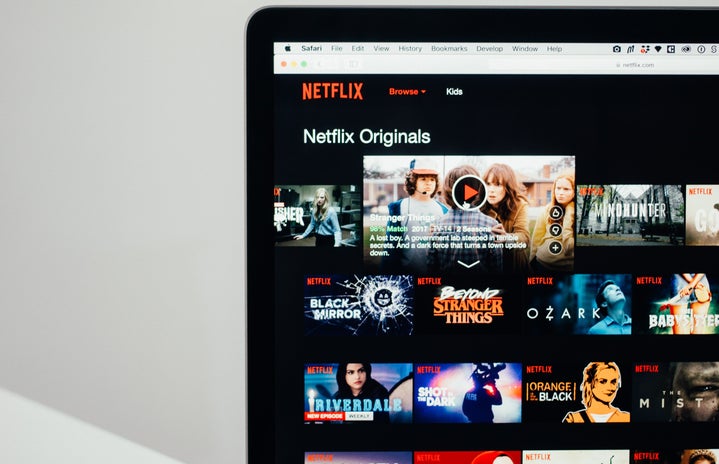During my time in yet another lockdown, I stumbled upon the new Netflix show, Ginny & Georgia. Having been introduced to the show as the modern-day Gilmore Girls by the characters themselves, I was intrigued to find out what this mother-daughter drama contributes for its 2021 viewers.
Despite having read several critical articles online, I approached the series with an open mind and an open heart, ready to laugh, wonder and, potentially, criticize as well.
The show follows the story of a young mother, Georgia, and her teenage daughter, Ginny, as they start afresh after moving around and living turbulent lives for years. The show subsequently portrays the experiences of both women, including their school and work life, their new friends and romantic interests, as well as the darkness creeping up on their picture-perfect new life.
Ginny’s story takes place in a high school setting, where she, an insightful outsider, finds herself quickly surrounded by friends and with the sudden need to navigate her newfound popularity. Plot lines following the lives of Ginny and her teenage friends address issues that often go unmentioned in teenage dramas, including self-harm, eating disorders, sexuality, family and women’s issues, and the power of social media, thereby uncovering the dark side of the teenage experienc.
In addition to portraying the new start of both protagonists’ experiences, the show also gradually uncovers the tragic and dramatic story of Georgia’s past. We learn that Georgia was sexually assaulted as a young girl, and fled home at an early age as a result. The contrast between her picture-perfect new life – including a beautiful house, designer clothing and an iconic convertible – and her “homeless” beginnings could not be greater. While the viewers – and the characters – perceive Georgia as striking, witty, and attractively determined, the portrayal of her younger self not only paints the picture of the character in all her layers, it also partially explains her life-long struggles, attitudes and motivations.
Importantly, the portrayal of sex, relationships, and sexuality troughout the show is convincing, real, and relatable. While most teenage shows either ignore the topic, or idealise first sexual encounters, Ginny’s sex scenes are among the most real I have ever seen. They successfully depict the combination of novelty, pleasure, and awkwardness that make up most sexual beginnings. The effect is immensely transformative and educational for the viewer, and will hopefully start a precedent for accurate portrayals of early sexual encounters in cinema.
What I particularly enjoyed was the description and depiction of femininity and the exploration of female roles on-screen. The topic of feminism is approached through both of the protagonists. In Ginny’s case, she is open and unapologetic in her assessment. Georgia, who describes the female experience as “death by a million paper cuts”, admits that as a woman living in a world created for men, her strategy was to adapt, and, ultimately, learn to play the game. We learn early on that Georgia was forced to get married, as a means of protecting baby Ginny from separation, and that she killed her latest husband, to protect herself from sexual assault. While neither of the characters are perfect – after all, real people never are – the show is an honest, if dramatized depiction of the struggles of being a woman.
Another aspect of Ginny & Georgia that cannot be ignored, as it makes the show particularly stand out, is its portrayal of issues related to the concept of race. Ginny is of mixed race, and, as a result, faces the consequences of living in a predominantly white area. As Ginny notes, she is “too white for the black kids and not white enough for the white kids.” She struggles as she attempts to find her way through life not only as a woman, but also as a woman of colour, which makes it nearly impossible for her to completely fit in and define her identity. In this way, Ginny & Georgia explores the former’s path to womanhood and in doing so, opens up a poignant conversation that is rarely addressed in any depth by the mainstream media.
However, despite addressing a wide range of important issues, many of which were openly feminist, the creators have been accused of normalising sexism with regards to Taylor Swift. This was because the singer’s name appeared in the last episode in an attempt to make a quippy remark – criticising Georgia’s love life, Ginny notes that her mother goes “through men faster than Taylor Swift.” While I understand the criticism, I find it unfortunate that for many, the show has been “cancelled” based on a throw-away line spoken by a protagonist: a character who is as imperfect as real people often are. Watching the show with an awareness of Swift’s response is important; however, it should not overpower the show’s contributions towards an acceptance and promotion of the notions of “difference” and “inclusion”- whether in terms of race, sexuality, or gender stereotypes. The show’s ability to uncover and explain these concepts is, in my opinion, empowering to new generations of both men and women.
Overall, I believe that Ginny & Georgia is a show worth watching. It is one that provides insight to the life of a teenager in today’s world, with all its perks and struggles, and additionally, promotes the ideas of feminism and female power in a real and refreshing manner while keeping its female characters human and genuine. They struggle, make mistakes, break up, and make-up in what I consider to be one of the most real shows today. Bearing in mind the media’s power and influence on society, and on the young generation in particular, I believe that Ginny & Georgia is a show that can have a positive effect on a new generation of female viewers. That is, if they are willing to accept the tone-deafness of one remark made by a protagonist.



